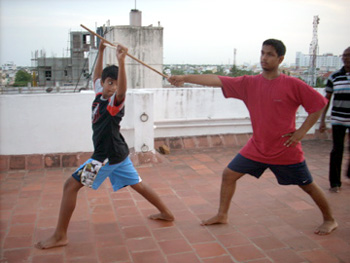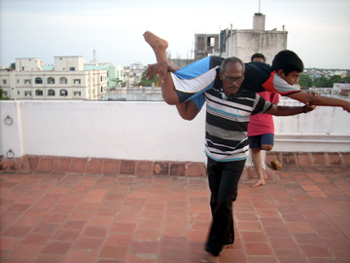When someone says ‘martial arts’, do you think Karate? Judo? Or Kung Fu? Well, its time to think again! Think of India´s own martial art, Kalaripayattu.
 Kalaripayattu is said to be the mother of all martial arts and was widely practised in Kerala for many generations till the eighteenth century. The Buddhist monk, Bodhidharma, was supposed to have taken it to China, and it was the forerunner of the various forms of martial arts popular in China and Japan. It consists of both unarmed combat as well as fighting using weapons like swords and shields etc. The British, when they colonized India, banned the teaching of Kalaripayattu. That was when it declined in popularity. But now, it is being revived and many people teach and learn Kalaripayattu.
Kalaripayattu is said to be the mother of all martial arts and was widely practised in Kerala for many generations till the eighteenth century. The Buddhist monk, Bodhidharma, was supposed to have taken it to China, and it was the forerunner of the various forms of martial arts popular in China and Japan. It consists of both unarmed combat as well as fighting using weapons like swords and shields etc. The British, when they colonized India, banned the teaching of Kalaripayattu. That was when it declined in popularity. But now, it is being revived and many people teach and learn Kalaripayattu.
One such teacher is Mr. K. T. Joseph (‘Joseph Master’) who conducts Kalari classes in the terrace of Krishna Teja Apts, which is located in Balakrishna road of Valmiki Nagar. He comes from a family of Kalari teachers. Mr. Joseph is from Kottayam district in Kerala and teaches thacholi parampara – named after Thacholi Othaenen, a legendary hero – a major style of Kalari. He came to Chennai almost forty years ago. He says, “I practised hard and was given permission to teach by the time I was sixteen.” Even now, at the age of sixty seven, he practises Kalaripayattu for two hours every day. He is in better condition than most people in the prime of their life.
His movements are so fast that they make you dizzy. His gracefulness and speed make everything he does look beautiful. He says, “Speed is one of the most important things in Kalari. One must attack the opponent and take him down before he is aware of what is going on.” ‘Fast, technical attack’ is one of his favourite phrases.
 He says, “There is a difference in the way you fight someone who is your friend and the way you fight someone who is your enemy.” He teaches ways of both attacking and incapacitating a person without hurting him, and the more dangerous ways of defeating someone who must be made completely helpless immediately – an assailant, for example. He says that anyone can hit, or attack, but the real skill is in blocking and evading the blows.
He says, “There is a difference in the way you fight someone who is your friend and the way you fight someone who is your enemy.” He teaches ways of both attacking and incapacitating a person without hurting him, and the more dangerous ways of defeating someone who must be made completely helpless immediately – an assailant, for example. He says that anyone can hit, or attack, but the real skill is in blocking and evading the blows.
One of the key ingredients of Kalari is marmavidya, or attacking the ‘vital points’ of the body. He has these things written down, but says he would reveal them only to the most advanced students and whom he could trust.
He possesses a video recording of a TV programme that was aired some years ago on Doordarshan, interviewing him and showing his students demonstrating Kalari skills. A large proportion of them were girls and he thinks it is very important for women to learn self defence.
In fact, in Kalari tradition, it was very common for women to learn Kalari along with men, he says. Unni Archa, who was the sister of Aromal Unni, a legendary hero in the folk songs of Malabar (Vadakkan Paattu) was well known for her prowess in Kalari.
He lays special emphasis on practice and says that one must put his heart into whatever he is learning. One must practise at least half an hour everyday. He says that one must learn everything that is taught with utmost devotion to the guru and God.
The Kalari classes take place every Monday at 6 p.m. It is for both children, ideally above 7 and for adults. The fee is Rs. 200 per month. For further details, contact – 4215 8742.
